Wait, So What Are Y'all Doing?
A brief timeline and explanation of a non-traditional, grassroots, we promise we aren't a cult, church
No, we aren’t a Bible Study.
No, we aren’t a cult (yet)?
No, we aren’t really a house church either— at least not in the way most house churches come to function.
Yes, we are a church.
And yes, I recognize the way we go about being church is highly unorthodox, untraditional and new to most folks which makes it rather hard to understand.
Of all the things I was warned about early on in church planting (depression, marital issues, isolation, loss of faith, traumatic betrayals…maybe check on any church planters you know, I don’t think they are okay) no one mentioned how hard it would be to constantly try and explain just what the heck we were doing.
Even I thought it would eventually get easier. Maybe once we got into a groove of things, I would finally land on a catchy elevator pitch that everyone could grasp. And while I do have one of those (i’ll share it in a sec), I haven’t found it to be anymore useful in trying to break through people’s preconceived notions of launch teams, launch dates, mass marketing strategies and Sunday morning set-up and tear-downs.
It also doesn’t help that who we are and what we are doing as a church has consistently changed since our first interest meeting roughly 17 months ago. Ironically, I believe it is our ever-changing nature and rhythms that prove we are right in step with most of what I see described as the early church in scripture. And yet, this movement based mentality is what seems to keep us confusing and confounding to most church goers of today.
I get why, but still, I hate it. I love what we are doing. I believe in what we are doing. I believe it’s important and matters and should and can be happening a lot more than it already is. I want people to understand what we are up to. And I want, as best as I can, to offer people opportunities to wrap their brains around this different way of thinking about and existing as “church”. So, consider this post a first at-bat in that endeavor. My first swing at helping you all make sense of our seemingly senseless expression of church.
I’ve already written some pieces that cover the higher level, “big idea” aspects to some of what we’re doing HERE, but for this post, I thought i’d keep it as practical as I can and simply lay out exactly what we’ve done, start to now.
We're taking a different approach to building a faith community. Instead of starting with traditional church structures or programs, we're beginning with what matters most: authentic relationships and intentional formation. Our foundation is a core group of people committed to growing together spiritually, supporting each other personally, and serving our greater community collectively.1
Here is how we’ve built that:
The On-Ramp
The first 6 months of us gathering was a trial run for all parties involved. Anyone interested in learning more about what this type of church might look like, feel like, and be like was encouraged to come along and try it out for a few months.
As we would gather (every other week to start, eventually increasing to weekly at about 3 months in) I was also trying out different forms of discipleship2 and engagement with scripture. In order for us to get to a place of maximum participation and shared responsibility, I knew how we gathered, even from the start, was going to be important in forming that.
If we were to spend these first 6 months with everyone coming in to hear me preach while we sang a few hymns as Paul strummed guitar (basically traditional church in miniature) this would do very little to form a culture where every voice mattered, where new and creative ideas could be shared and explored, and where responsibility and wisdom were resources everyone had access to and felt not only able but eager to contribute.


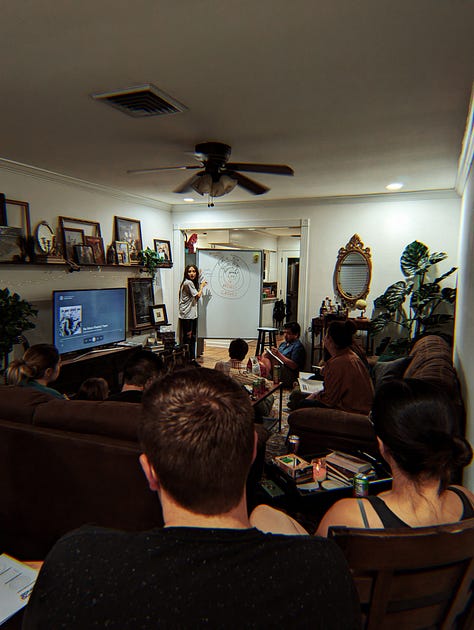
Additionally, if our long-term goals were ever going to work, we were going to need to get to a place of sincere trust, vulnerability, and mutuality with one another. I needed these people to know each other and enjoy each other. And them coming to listen to me talk for 30 minutes was not going to be efficient in achieving that. I needed to promote ways of them communicating with one another, ways of them building trust and safety with one another. Vulnerability would not be a demand of them. It would be something we had to build toward and that would take creative and intentional forms of gathering.
And finally, I needed these folks to begin to trust themselves. I needed to begin to work and stretch those muscles of individual discernment and them listening for and to the voice of God within them, not just me. I quite literally needed them, their ideas, their insights, their passions, and thoughts if this was ever going to work. So I needed to build an environment and a space where those ideas, insights, passions and thoughts could be centered and fully on display.
So we played games and we did awkward icebreakers and we would go grab beers at our favorite neighborhood spot if only 6 of us showed up. We experimented with communal forms of scriptural engagement like Lectio Divina and Visio Divina. We’d work through passages together, me coming completely unprepared, so we could rely on the insights, perspectives, and questions from within the community to spur us on in learning more. We tried things I don’t think we will ever do again and found things we all loved and still use to this day. Those early days were so sweet and unsure and I don’t think i’ll ever be able to thank these folks enough for continuing to show up week after week to something so completely unknown, soley trusting me and the Spirit of God they found in that room amongst one another.
The Commitment
After several months of trial and error and figuring all of this and one another out, it came time to commit. Now, church membership has often been abused, church covenants can turn controlling quick, and often “commitment” to a church means commitment to a set of ideological and theological beliefs, a brand, or even a single pastor. These were difficult realities for a whole lot of church bruised folks to work out, but here were 2 things we knew for sure:
It is hard to build any real form of safety or trust when you aren’t sure who is showing up week to week.
Expectations matter and communicating and keeping to shared expectations is what allows any relationship to flourish. Never knowing or having completely different expectations is what will slowly drain and kill a flourishing relationship.
In order to move forward in depth, co-creation, greater community involvement, and dependency, we simply needed to know who was in this for real and for the long haul (as best as they could discern at that current moment) and we needed to work out what expectations we had from those individuals if we were to commit to journeying with them for the long haul too.
So we wrote out our needs, our wants, our hopes and desires for and from one another and we put them all on post-it notes for us to chat about together. Those post-it notes and that conversation would be summarized and typed up into our “Core Commitment” which we would all sign over punch (duh, cause cult) the following week.

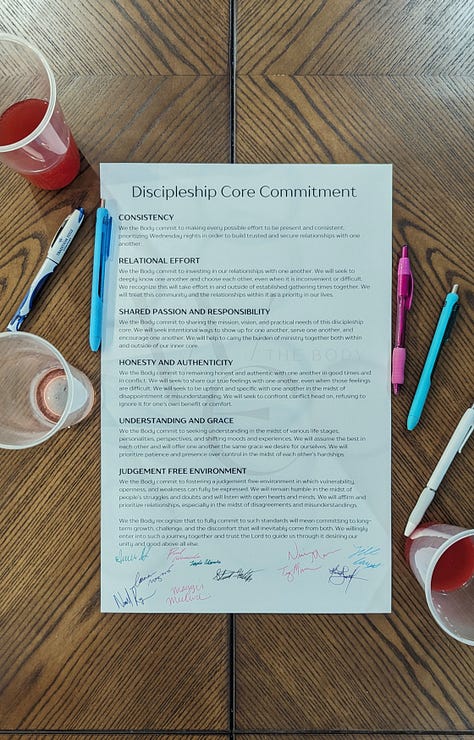
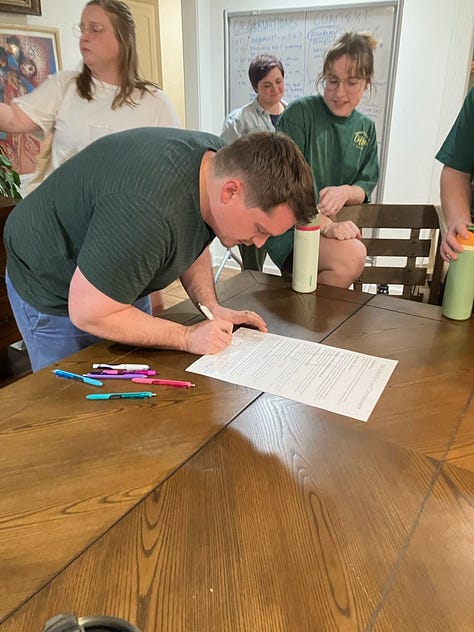
In doing so, we committed not to a set standard of belief nor moral behavior. We did not commit to “We the Body” or to me as it’s leader. We committed to each other.
15 individuals first attended our initial interest meeting and we would have a handful of folks come in and out during the following 6 month period. But in the end, 11 of us signed that final commitment.
Our goal had been anywhere from 8-12. We were basically the 12 minus Judas…not too shabby.
Relational Growth
If our commitment signing was our DTR3, the next few months were the joys, the excitement, the curiosity, and also the inevitable conflict of any new committed relationship. We were committed to one another and with that, were committed to learning more about and growing deeper with one another, faults and all.
We shared our stories of faith and church trauma together. We did Passion PowerPoint nights4. We discovered shared loves of reading, differences in how we prefer to engage with God, even differences in how we prefer to refer to God. We began to learn each other’s quirks, oddities, and senses of humor. Relationships began to form completely outside of me. We had to have honest conversations, deal with deep discomforts, and keep showing up anyway. It was a sweet several months of simply enjoying one another and investing further in these mutual and messy relationships we could count on.

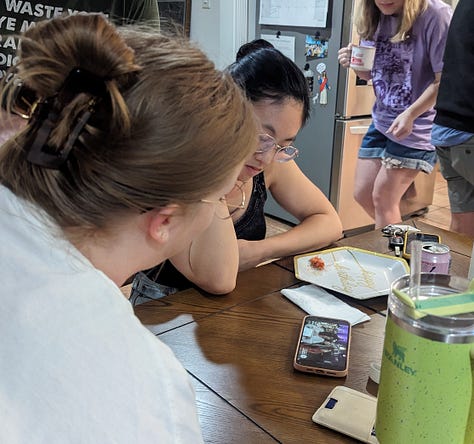
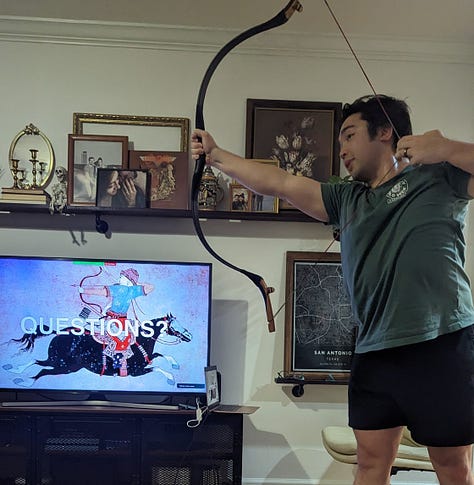
Communal Discernment
So this is about where most of our similarities with traditional house churches ends. Many house churches either remain incredibly insular— becoming a micro version of our greater holy-huddles that solely exist to serve and benefit our own, OR they become incredibly evangelistically focused— attempting to convert as many neighbors and park dwellers as possible in order to multiply more local models.
I like to think we are a more missionally minded than the former, and more holistically aware of the Gospel’s greater message than the latter.
Our goal from the very beginning has been to exist for a purpose that was greater than ourselves. However, we have never believed that greater purpose is to save as many souls as we can for heaven by leading strangers through a Gospel tract and a quickie prayer of salvation. We believe in a holistic Gospel that seeks redemption not just spiritually, but also physically, economically, politically, mentally, emotionally, and relationally. And in this respect, we had endless options before us as to how we might live out the Gospel communally outside of the four walls of our living room. Thus, we began a process of communal discernment.
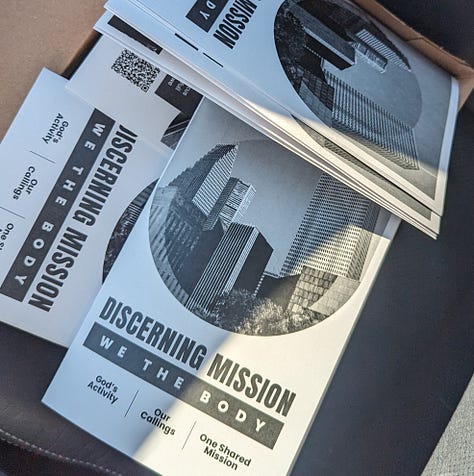
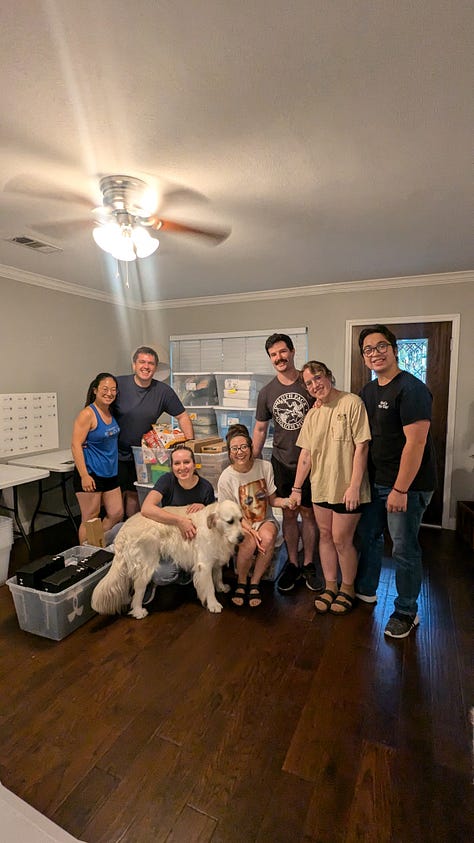
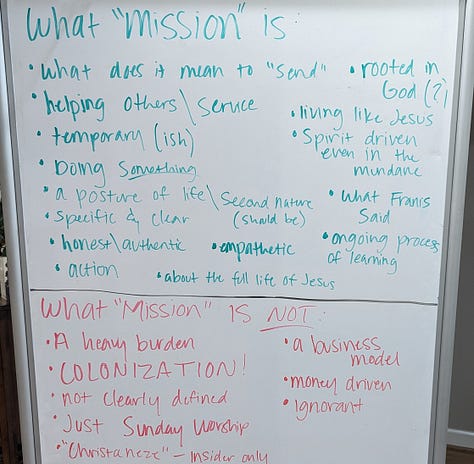
We took several months to pray, discern, and reflect on our own and then collectively, asking questions like:
Who or what am I passionate about? Where or with whom do I feel most myself? Who am I in consistent proximity to? What events in my life seem to remain consistently prevalent? When I think about becoming a whole-er, fuller, more joyful and loving version of myself, who is most likely to benefit from that? Who do I most hope benefits from that?
We asked such questions believing that God didn’t need more from us: more work, more commitments, more obligations, more tasks. But rather, God longed for us to simply be more present within the work, commitments, obligations, and tasks we already had. We didn’t need to choose from some long assortment of causes and determine which seemed best or most practical, reasonable, and impactful for us to engage with. We simply needed to notice what causes were already revealing themselves as present within our everyday lives and determine how best we could show up and make a difference within those causes as a community.
So we engaged with these questions individually, and then began to discuss them communally. And as we did, we looked for overlap, for continuity, and for any similarities in what each of us felt the Lord was revealing. And eventually we landed on a cause that felt pressing and present to all of us. And we’ve been working toward restoration within that space ever since.
Community Formation
“A community in Houston, Tx for those exploring, grieving, healing, or reconstructing their faith.”
This is what we, as a body, have been building and forming for the last several months. Or in the words of that body…
“A space for those who are still longing for community and reconstructing their beliefs.” “For those who want Jesus and community but don’t trust the church for one reason or another.” “A space for people who have been burned by the church and just need a space to process with other people.” "For people who don't feel like the 'church' is right for them, but don't know what other options they have." "For people tired of fake ass bitches." "For people who need a safe community."
We plan and we strategize and we try and we fail and we try again anyway to build and foster a community for those who aren’t so sure about church or what they believe but still want a community that’s there for them anyway. Together, we are building a community where worship is not a requirement for belonging and where sermons are not our most consistent mode of communication. Where meals and drinks and games and gatherings are how we foster togetherness and safety, and where those wanting and willing to dive deeper into their spiritual or religious healing are free to do so at their own pace.
Right now, that looks like hosting monthly gatherings at breweries, restaurants, parks, and trivia, where this growing community can begin to dip their toes in, explore, meet some folks, and simply exist free from expectation. We’ve also begun opening up some of our weekly core gatherings to those interested so that they can begin to explore what it looks like for us to continue to commune with and worship God even after harm from religious institutions.5
But we remain flexible and curious, open to adjusting our rhythms, our patterns, and schedules based on the ongoing needs and wants from within this budding community who we are still in the early stages of getting to know and love. And we do so, together, as a body, committed to bringing the healing and restorative power of Jesus Christ into the very real and present space that is religious harm— a space far too many of us know all too well.

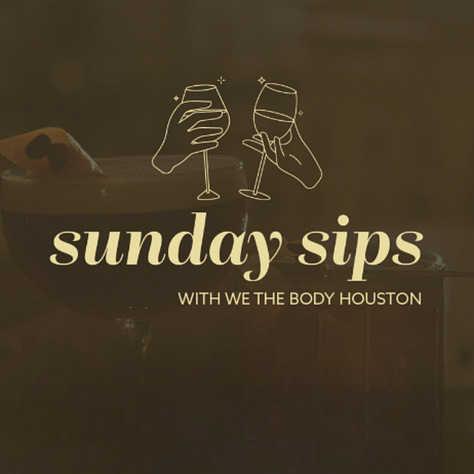
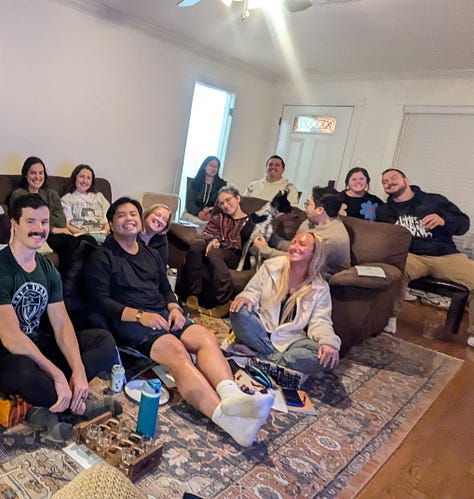
And that’s church for us, now.
It’s commitment and it’s relational growth. It’s communal discernment and it’s building something together. It’s making reservations for 20 and group chatting about the incoming rain. It’s figuring out the best coffee shop to co-work at and confessing to each other, “I may have overshared there…my bad.”
It’s the spaces that stretch us, that bring on discomfort, uncertainty, and newness. And it’s the spaces that shelter us, where we can be our messiest selves, confess our scariest truths and find camaraderie and help to keep entering back into those stretching spaces anyway. And this is how we have come to build that. A church that stretches us beyond ourselves but also shelters us as our truest selves.
And that, my friends, is what We the Body is doing.
Good elevator pitch, amiright?
I don’t tend to use this word much anymore, but I did a lot the beginning of this journey. I once believed discipleship could be much more formulaic, consisting of different plug-in-and-use tools. We did a lot of that early on. However, as our core began to form, I relied less on tools and more on spirit-led forms of engagement which I now refer to as modes of “formation.” Just goes to show how formative this experience has been for all of us.
What the youngins use to refer to a conversation known as “defining the relationship”
Every week we had 1-3 folks present a powerpoint on something, anything, they were passionate about.
Half of our weekly core gatherings remain closed for the sake of the continued growth and health of our core members. This allows them to still have a consistent and safe space to process and plan, discovering together how to best serve and love this growing community at large.





LOVE this! Similar movements are rising up all across Alabama, Georgia, Tennessee. The disdain for the 'institution' and the desperate search for authentic siblings in Christ has captivated thousands here, mostly meeting in houses, small community centers and retail spaces, city parks, and local eateries. It's a fascinating time for the 21st century Church.
Christianity the faith needs what you are doing, so I thank you.